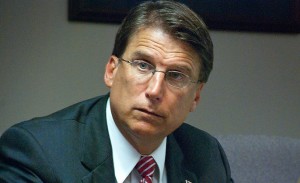
RALEIGH, N.C. — The governor of North Carolina issued an executive order on Tuesday to help clear up what he believes is confusion and misinformation about a recently passed state law that annulled a controversial “bathroom bill” in Charlotte and banned other cities from passing similar ordinances.
“I have come to the conclusion that there is a great deal of misinformation, misinterpretation, confusion, a lot of passion and frankly, selective outrage and hypocrisy, especially against the great state of North Carolina,” Gov. Pat McCrory said in a statement. “Based upon this feedback, I am taking action to affirm and improve the state’s commitment to privacy and equality.”
The executive order declares that businesses can enact their own policies surrounding restroom and locker room use, and that businesses and local municipalities can establish their own non-discrimination policies surrounding the employment of homosexual and transgender persons.
McCrory also called for lawmakers to send a bill to his desk that would reinstate the ability to sue for employment discrimination.
“I will immediately seek legislation in the upcoming short session to reinstate the right to sue for discrimination in North Carolina state courts,” he said. “Simply put, I have listened to the people of North Carolina, and the people of North Carolina are entitled to both privacy and equality. We can and we must achieve both of these goals.”
As previously reported, last month, North Carolina lawmakers passed the Public Facilities Privacy and Security Act after the Charlotte City Council voted to expand the city’s non-discrimination ordinance to add provisions for homosexuals and those who identify as the opposite sex—including in regard to restroom and locker room use.
“Public agencies shall require every multiple occupancy bathroom or changing facility to be designated for and only used by persons based on their biological sex,” the legislation reads in part. “Local boards of education shall require every multiple occupancy bathroom or changing facility that is designated for student use to be designated for and used only by students based on their biological sex.”
The Act had been presented after the Charlotte City Council voted 7-4 last month to expand the city’s non-discrimination ordinance to add provisions for homosexuals and those who identify as the opposite sex—including in regard to restroom and locker room use.
McCrory promptly signed the Public Facilities Act into law on the same day of its passage, and later released a fact sheet to clarify what he believed were misunderstandings about the content of the ordinance.
“Businesses are not limited by this bill. Private individuals, companies and universities can adopt new or keep existing nondiscrimination policies,” it read in part. “[I]f a privately-owned sporting facility wants to allow attendees of sporting events to use the restroom of their choice, or install unisex bathrooms, they can. The law neither requires nor prohibits them from doing so.”
“This law simply says people must use the bathroom of the sex listed on their birth certificate. Anyone who has undergone a sex change can change their sex on their birth certificate,” the fact sheet also advised.
Homosexual and transgender advocacy groups state that they are unsatisfied with McCrory’s executive order because it did not revoke the requirement that residents must use the restroom and locker room consistent with their birth gender at schools and public agencies.
“The governor’s action is an insufficient response to a terrible, misguided law that continues to harm LGBT people on a daily basis,” Sarah Warbelow, legal director at the Human Rights Campaign, told the Associate Press. “It’s absurd that he’ll protect people from being fired but will prohibit them from using the employee restroom consistent with their gender identity.”
Others have stood behind the law as a sensible move to protect the privacy and decency of residents.
“It is just common sense that men should not go into the women’s restrooms,” Tami Fitzgerald, the executive director of the North Carolina Values Coalition, told reporters. “It’s ridiculous to have such an uproar.”
Become a Christian News Network Supporter...


